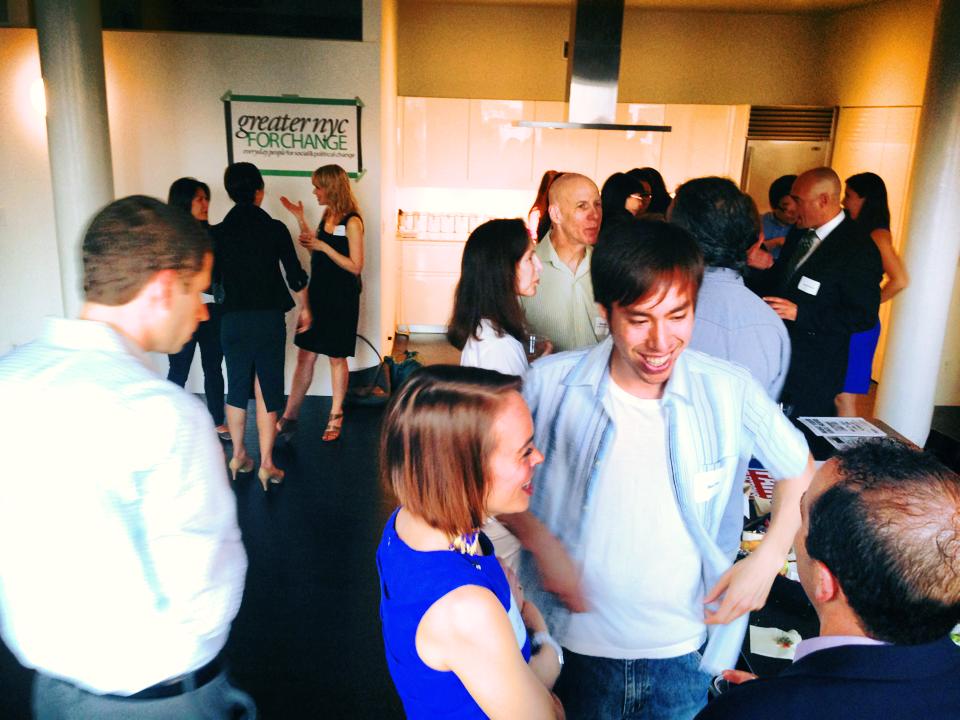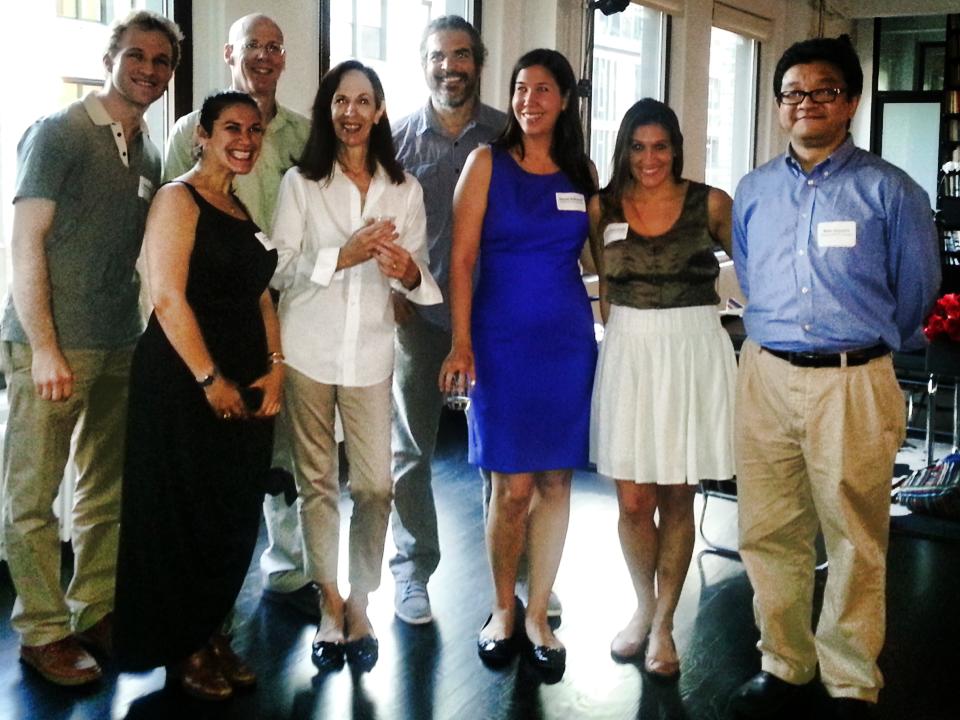“You’ve convinced me. Now go out and make me do it.”
Where: Foley Square (J or Z trains to Chambers Street or 4, 5, or 6 to Brooklyn Bridge-City Hall)

“You’ve convinced me. Now go out and make me do it.”

Greater NYC for Change Annual Membership meeting

Over the last few years, Greater NYC for Change had led in the fight for health care reform, gun violence prevention, and reducing the glaring income inequality in our nation. This year, we’ve taken the steps to become a nonprofit corporation, and we were honored to launch as a nonprofit on Wednesday, May 22nd. Other community leaders and progressive visionaries joined in to plan great things!
After wine and cheese, the members voted in the slate of executive board members who will run the day to day operations of the group. Later this year, we’ll kick off a bigger party to celebrate – please stay tuned! This is a milestone for us. We hope to amplify your voice and serve worthy causes in partnership with your leadership and allies, in the cause of social justice.
Below are some of our top priorities for the year to come:
· Partnership with Health Care for All New York to educate and enroll eligible New Yorkers in the new health care exchange opening in January 2014
· Combatting voter suppression laws in Pennsylvania
· Advocating for reversal of the harsh federal budget cuts contained in the sequester and for maintenance of protections under Social Security, Medicare, and Medicaid
· Partnership with
· Working to reduce gun violence in New York City communities and to pass gun safety legislation on the national level
· Organizing parents, teachers, and other members of the community to lobby state policymakers to expand the pre-k budget, raise educational levels, and combat poverty
· LGBT initiatives not limited to overturning DOMA and ensuring recognition of Marriage Equality in all states
· Organizing candidate forums to encourage civic participation in local elections
· Advocacy against income inequality, in particular for a true living wage in New York City
It’s election season! Our next mayor, public advocate, and other city officials are vying for your votes. What do you want your post-Bloomberg city to look like?
This year’s primary is September 10, and general election is November 5. Register to vote here.
|
|
|||
|
|
||
Here are some of the amazing (and hard-hitting) questions that Greater NYC for Change members want to ask the candidates for mayor, public advocate and Manhattan borough president.
Questions for the Mayoral Candidates*
*some can be asked of Public Advocate and Borough President candidates
Health care
In New York State, 2.5 million people will soon be eligible for health care coverage under the Affordable Care Act, through Medicaid expansion and exchanges. Enrollment starts Oct. 1st of this year. But those eligible are both young and uniformed: nationally, over half eligible (54%) are under the age of 34, and 78% have no idea what a health care exchange is (according to Enroll America). If elected, how do you plan to educate your constituents about enrolling? What local resources will you commit to making sure the public is aware?
Gun Violence
Do you support the policies enumerated in New York State’s recently passed NY SAFE Act, and what are the tactics as well as long-range strategies you support to reduce gun violence in New York City communities? Are there new ways to look at the old but accelerating problem of urban gun violence?
Homelessness
Forbes estimates that 40,000 people were left homeless by Sandy, adding to the 50,000 already homeless in New York City. Many of the newly homeless were renting apartments that were affordable to them but do not have that opportunity again. How do you plan to address this problem both from a housing perspective but also, specifically, how do you plan to keep track of homeless affected by this crisis to address their needs?
Transportation
Will you continue the fantastic pro-bicycling policies that Bloomberg has initiated and completed throughout the five boroughs?
What are the bike exchange program risks, cost effectiveness, and impact on the city?
Term Limits
In what way did you show respect for the will of the electorate as it related to term limits and why?
Education/Libraries
What should individuals who own private schools in NYC that provide high quality education do when there is an overwhelming phenomenon of charter schools throughout the boroughs forcing private schools to close their doors? Will there be a ceiling or cap on how many more will open?
What do you plan to do about city waste & corruption in the public library systems?
Sandy recovery
The billions in federal aid, administered by Habitat for Humanity International here in New York, are primarily directed at home owners, not renters. There is one program open to renters (and therefore the undocumented), from the American Red Cross, but it is underfunded. How do you propose to meet the needs of renters and the undocumented?
What are you going to do to insure Community Development Block Grant funds get to community based non-profit recovery organizations and are used towards long term recovery – and not simply distributed via a recovery authority or through appointed staff at City Hall?
Would you be willing to allocate HMGP (Hazard Mitigation Grant Program) to make a meaningful and sustainable difference to the lives of individual residents? Governments typically use those funds for infrastructure – but some states, like Florida, allocate a portion of those funds to mitigate impact on homeowners and community-based non-profits.
In the future, how do we avoid the Mayor setting-up a recovery fund that cuts off non-profits from their donors and distributes through a closed process managed by government employees with little or no experience in disaster recovery? What can be done to fund the work of community and faith-based non-profit organizations in times of crisis?
Lightening question/ yes or no: After Hurricane Sandy hit, on October 31, 2012, Mayor Bloomberg refused help from the National Guard to assist our brave — but overwhelmed — first responders. If you were in the same position, would you have refused help from the National Guard? [Follow up question: what is one specific thing you would have differently from Mayor Bloomberg to respond to Hurricane Sandy in the first week of the crisis?]
Economy
Mayor Bloomberg, like Giuliani and Koch before him, has maintained that continued granting of tax breaks to large corporations is essential if we are to avoid the migration of such businesses from New York to other states and regions. At the same time, we’ve faced cutbacks in various social services amid the very slow and lopsided economic recovery–and the sequester cuts will only increase pressures to reduce costs. What are the implications of these trends for middle class people in New York and what, if anything, do you propose to do differently?
Questions for the Public Advocate
What would you do to make the Public Advocate’s office a budget line item instead of being subject to political whim?
What plans to do have for outreach work, funding, and support for LGBTQ youth experiencing homelessness in NYC?
In light of the Boston Marathon tragedy, how are you going to approach the difficult challenge of “no profiling” and at the same time keeping the public safe?
What will you do to increase the relevance of this vestigial office?
Questions for the Manhattan Borough President
What are your plans for mass transit, like light rail, and enforcing zoning to prevent proliferation of sunlight- and sky-killing skyscrapers?
How would you address the displacement of poor and working class New Yorkers from living in Manhattan?
How are you going to address the difficult problem of union member public employee logging in higher-than-usual hours in the final years of their employ, to bump up their pension payments?
How do you suggest we encourage youth of NYC to take interest in your role?
4 WEEKS OUT:
3 WEEKS OUT:
2 WEEKS OUT:
1 WEEK OUT:
LINKS:
2012 Presidential Debates: http://www.debates.
Last month, some Greater NYC for Change members jumped into a uniquely independent, collaborative political action project at Occupy Wall Street. We encourage you to join this group Tuesday to deliver petition signatures at “Occupy for Education.” Help send a strong message to Cuomo on the Millionaire’s Tax!
WHEN: Tuesday, November 8, 3:30-5:30
New Yorkers To Deliver Petition to Governor Cuomo on Election Day. Over 2,000 New Yorkers Signed Petition for Millionaire’s Tax at Occupy Wall Street.
On Election Day, Tuesday, November 8 at his New York City office, Governor Andrew Cuomo will receive over 2,000 signatures from constituents arguing for extending the Millionaire’s Tax beyond December 31, 2011.
The signatures were collected by an unaffiliated group of activists at a “Political Action Table” in Zuccotti Park, the heart of the Occupy Wall Street protests. The table occupied a spot in the park from October 2 through October 30, and volunteers gathered signatures for fair taxation and against hydro-fracking, offered voter registration forms, and provided phone numbers for constituents to speak out to elected officials.
While Occupy Wall Street has no legislative agenda, activists at the Political Action Table found themselves welcomed and encouraged by the culture of free speech and community engagement at Zuccotti Park. A diverse group of volunteers, occupiers, and curious newcomers engaged in passionate conversations about rising economic disparity and tax policy. The overwhelming sentiment favoring the existing millionaire’s tax is a limited but vital and immediate response to the international movement for solidarity with the 99%. Many who signed the petitions expressed deep concern for school children, seniors, the disabled, and public sector employees who face almost $5 billion in additional budget cuts if the tax ends as planned.
The Millionaire’s Tax, once thought a dead issue, has been revived by voices rising from the Occupy Wall Street movement. At the now-daily marches and rallies throughout New York, slogans against “Governor 1%” have framed a stark contrast between the governor’s position on the Millionaire’s Tax and the views of the majority of his constituents. A recent Siena poll found that 72% of New Yorkers prefer that the Governor set aside political pressure from the richest taxpayers and uphold his responsibility to all New Yorkers by extending the tax surcharge.
The unaffiliated group who collected the signatures will deliver them while joining the “Occupy for Education” event at Governor Cuomo’s New York City office at 633 Third Avenue this Tuesday, Election Day, at 3:30 p.m. The event is intended to raise awareness of the $1.4 billion in cuts for New York City schools alone that will result from the tax cut for the most affluent taxpayers. The event organizers point out that budget cuts will further deprive students of their basic right to education promised by elected leaders so as to ensure a stable and thriving society.
The letter accompanying the petitions calls on the governor to “act as you have in the past, as a leader who responds to the needs of constituents, even when that means going against a powerful minority.” “Your constituents,” it continues, “overwhelmingly support a continuation of the “Millionaire’s Tax” surcharge that allows New York State to uphold its obligations to fund vital services, avoid further job losses in the public sector, and respond to the needs of the 99%.”
Further information about the Political Action Table at Occupy Wall Street can be found at www.occupywallstreetkit.com.
Contact: amymiller3@gmail.com.